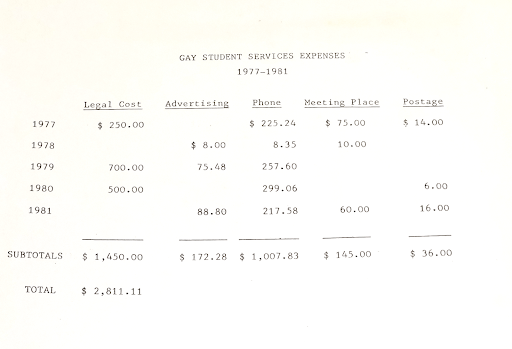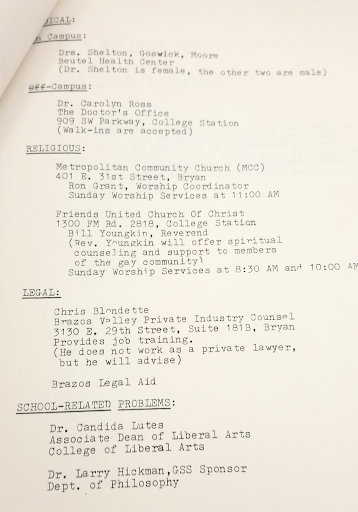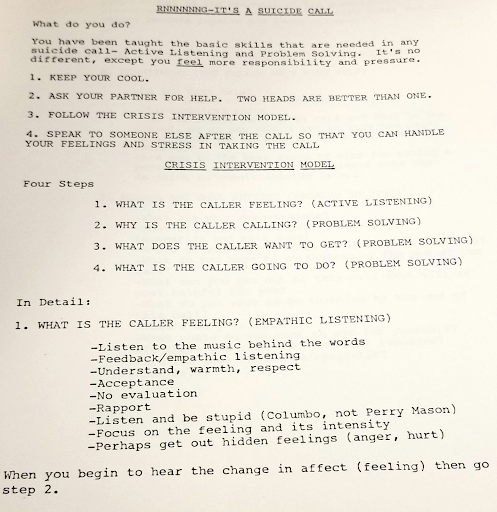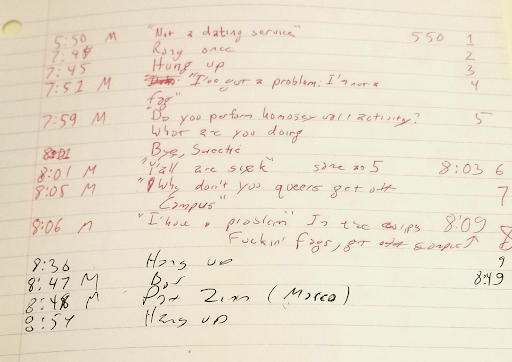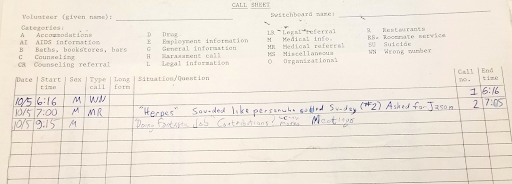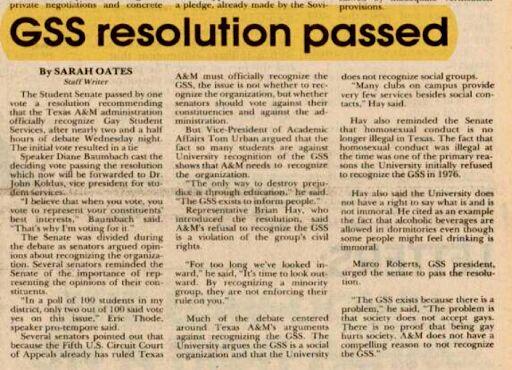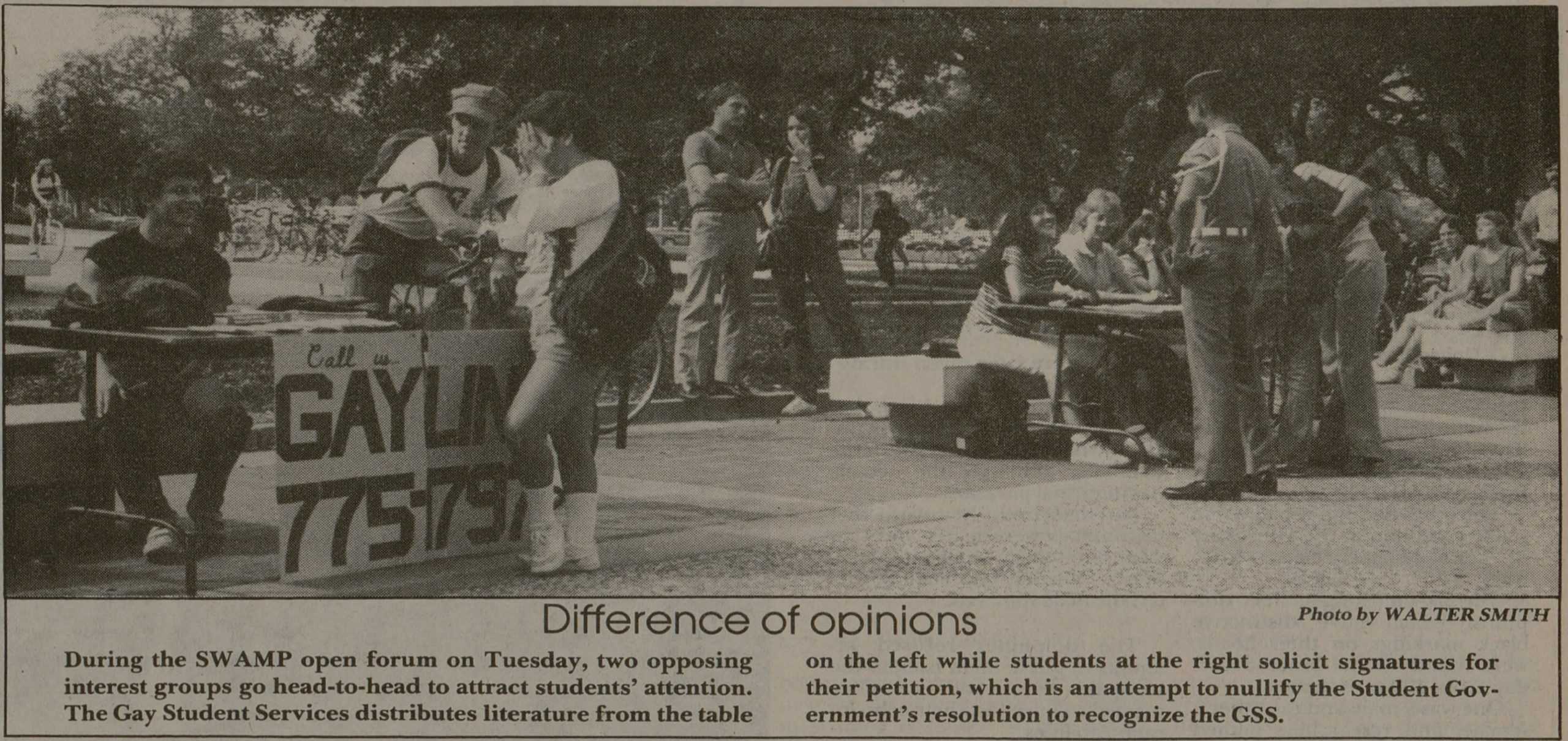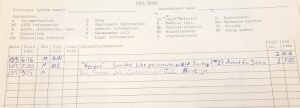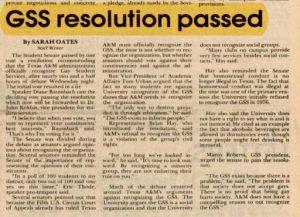Editor’s Note: This story highlights sensitive issues and may contain triggering content.
An anonymous hotline run by LGBTQ+ Aggies in the 1970s and 80s paved the way for the pride seen on campus today.
Six years after the Stonewall riots, a handful of gay and lesbian Aggies founded Gay Student Services, or GSS, a social organization which became the first explicitly gay student organization at Texas A&M. To support other gay students, GSS started the “Gayline,” an anonymous referral hotline that connected callers to everything from affirming health services to finding local gay bars. Former students from two generations of GSS said the Gayline did more than kick off a high-profile court case; it provided a support system and safe havens for an acute minority of A&M’s student body.
One of the founding members, Michael Garrett, Class of 1977, said he became involved at a time when he couldn’t imagine the Supreme Court ever recognizing gay marriage. At first, members of GSS, known first as Alternative, were hesitant to even seek public recognition as a student organization by A&M’s administration.
“It was completely homophobic,” Garrett said. “There were a few supportive people, but the administration could not handle it at all, end of story.”
Before the hotline, the predominant way to find other gay people in the 1970s was through mutual acquaintances, Garrett said. You had to know somebody who knew somebody else, and all of it was very under-the-radar for the sake of safety. It was hard to know who to trust, Garrett said.
“There used to be a one-story building across from the YMCA building, and they had campus roommate services there,” Kevin Bailey, Class of 1987, said. “They had big 5×8 files with cards in them to write information and phone numbers on. I was there looking for a roommate and saw a card that just said, ‘My name is Eric, I’m gay, and I know a lot of people that are looking for roommates,’ and it had a number on it.”
Eric was the president of GSS in 1984, and before long, Bailey joined the group and was helping to staff the same referral hotline he had called. He later became the historian for GSS, and when he wasn’t “working late into the night on computers,” he said he worked to piece together the story of the group’s early years. Altogether, his collection of records and other media, later donated to Cushing Library, has preserved a portion of LGBTQ+ history often forgotten.
Coming together
“I had come out to myself in 1972, but wasn’t really ‘out’ until much later,” Garrett said. “My freshman year at A&M, I was just adapting to the culture, but when that first group of us happened to meet by accident we realized there were more of us than we thought.”
As Alternative slowly grew in numbers as a social group, the members started thinking about how to make other students aware that there was a supportive group, said Garrett. But their first attempts were met with apathy and resistance.
“The first thing we thought of was a Speaker’s Bureau, where those willing to be publicly out would speak,” Garrett said. “Not just on campus, [but] any place in B/CS.”
The members hoped to speak to their experiences and dispel myths about being gay, Garrett said, much like the Coming Out Monologues now hosted by the LGBTQ+ Pride Center.
“We wanted to make people comfortable being gay,” Garrett said. “That’s the reason we came out so publicly, we were out and okay with it and wanted to try and let people know it was okay. Although very few people were ever interested in hearing us.”
Alternative decided to have those interested come to them, and the Gayline began in 1975 as a second phone installed in student Mike Minton’s mobile home, Garrett said. The group would regularly gather at Minton’s home ready to answer the phone, whether they were visiting, studying or had “pushed all the furniture out of the way to dance,” Garrett said.
Advertising the Gayline with flyers did not go over well with the administration, Garrett said, nor with the students who often ripped the flyers down. Alternative was forbidden from on-campus advertising unless it were a recognized student organization — which John J. Koldus III, vice president of Student Affairs at the time, would not allow. This conflict produced the change from Alternative to GSS and the nearly decade-long court battle that ended in 1985.
“When they started the court case, they were aware that in order to get around A&M’s ban on social organizations they needed to provide a service to the community,” Bailey said.
Running the Gayline
The Gayline started small, but grew to have an expansive list of local referrals and consistent volunteer training from professional counselors. Their operation wasn’t cheap, Bailey said, but the service was sustained by collections from members and donations from sympathetic members of the community.
By the time Bailey joined GSS, he said the Gayline was a forwarded line. The physical phone box was installed at the local Unitarian Universalist Church, but whoever was staffing the line had calls forwarded to their personal lines at their homes. As their membership and services developed, so had their methods, Bailey said.
“Our intention which we tried to get across to the university was that we were trying to provide support, and for real counseling we referred callers to professionals,” Garrett said. “Often someone who called was closeted and didn’t know what to do, or someone straight wanted to know what being gay was like. Sometimes they just wanted to know where the gay bars were.”
Given the administration’s negative attitude toward GSS, callers didn’t trust the campus counselors or other services, Garrett said. This prompted GSS to find people in the community who were receptive to them, which was not an easy task early on.
“I can think of one particular therapist and one physician who were okay,” Garrett said of his time working the line. “We did have a counselor affiliated with Brazos County. She gave classes to those of us who were going to be answering the phone on how to handle situations like when someone was suicidal, how to refer somebody to mental health counseling and convince them to do it and other basics.”
Those classes were not a one-time occurrence. Training guides provided by Bailey describe a wide range of techniques such as problem solving with the callers, warning signs of suicide and good responses when handling emotional conversations.
The guides kept from the 1980s were provided by counselor Rick Grossman and the Suicide and Crisis Center of Dallas. The Cri- sis Center even provided questionnaires and tests for volunteer training so that in potential
emergencies volunteers could help until professionals could intervene. However, many calls were not seeking help, both Bailey and Garrett said.
“There were a lot of prank calls,” Garrett said. “But back then it was easier just to make fun of them, which pissed them off.”
According to preserved call sheets, the crank callers often used slurs, made mocking sexual comments or demanded they “get off campus,” often.
Making change
“[The Gayline] broadened our community, but it was still difficult at the university to be out,” Garrett said. “That didn’t change the entire time I was there.”
As the court case proceeded in the background for GSS, the men both recalled a number of news articles and opinion pieces, mostly unsupportive or unrepresentative, regarding the organization.
“Once the lawsuit was filed and I came out in an interview for the [Battalion], I’d get cat- calls from dorm rooms as I walked across campus,” Garrett said. “But there was also a period of time where campus cops had to escort me to class. When I got to campus I checked in with campus police, someone would be as- signed to me, and as long as I was on campus they had to follow me around. When I was in class, they stood outside the classroom door.”
Harassment came from A&M faculty and staff as well, Garrett and Bailey said. In one class in particular, Garrett’s grade was lowered from an A to a D, and when questioned, the professor said if he had spent less time on “his other activities” then his grade would not have suffered. Sherri Skinner, Class of 1984, a doctoral student when GSS began, likewise had many academic issues, mainly with conducting research for her dissertation.
“It’s hard to say stand up and be proud if it means you lose out on support or love,” Bailey said. “If you don’t think your family is supportive, you need to find a support group. That was really the biggest thing with not just GSS, but other people I was involved with.”
Yet slowly but surely, the culture began to change. In October of 1985, the Student Senate narrowly passed a resolution recommending that the administration officially recognize GSS.
The court case was decided in favor of GSS on April 1, 1985, and it finally became a recognized student organization. By the late 1980s, there was less of a need for the Gayline’s anonymity, and eventually the line was disconnected, Bailey said.
“We got there,” Garrett said. “It took all of us to work at it, and we’re still working at it.” The culture didn’t just change at A&M. Gay activists became highly organized in the 1980s during the AIDS crisis, culminating in a march on Washington, support from the CDC and WHO and anti-discrimination legislation in the 1990s. Many of those achievements began with small, “backyard” minority communities such as Alternative and GSS.
Garrett was unaware of the creation of the LGBTQ+ Pride Center at A&M, and was “shocked” to hear about it for the first time.
“What makes me truly happy is that if the work that we did back then has led to the fact that y’all can have a pride center on campus, then we accomplished our goal,” Garrett said.
Both Michael Garrett and Kevin Bailey are now peacefully retired with their partners in Houston and Dallas-Fort Worth, respectively.
“I’m glad that we were able to help, that somehow or another things that we did back in the 1970s has made life easier for LGBTQ students at Texas A&M,” Garrett said. “All we wanted to do was just be treated like human beings.”
A history of A&M’s Gayline
May 31, 2021
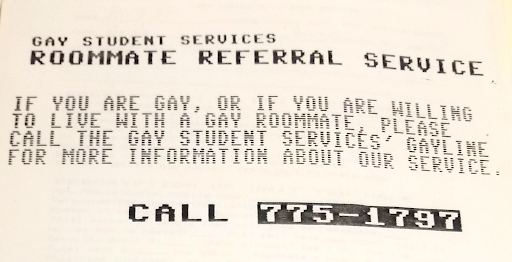
Photo by PROVIDED
Gayline through the years
Donate to The Battalion
Your donation will support the student journalists of Texas A&M University - College Station. Your contribution will allow us to purchase equipment and cover our annual website hosting costs.

















